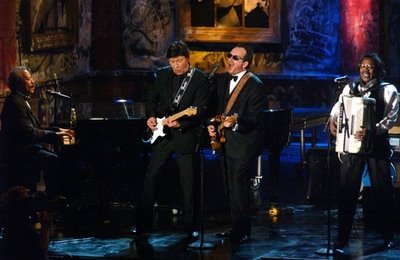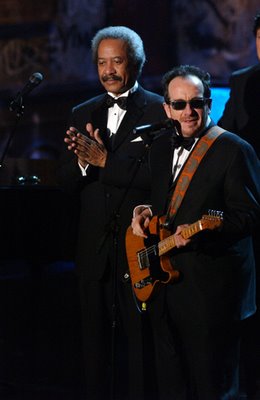
New Orleans always has embraced the spirit of "laissez les bons temps rouler," and even after Hurricane Katrina laid the city to near ruins, the good times have continued to roll, at least musically, in the Big Easy.
That was the message conveyed by Elvis Costello and Allen Toussaint in a rambunctiously joyful, emotionally fulfilling, nearly three-hour concert Sunday night at the Ravinia Festival. Accompanied by Costello's regular band the Imposters and Toussaint's signature Crescent City Horns, the two celebrated New Orleans' inherent bonhomie but also aimed barbs at the governmental incompetence that almost allowed the Pearl of the South to float away.
Their just-released disc, "The River in Reverse," pairs the seemingly mismatched Odd Couple in lesser-known songs from Toussaint's huge catalog and new tunes written jointly for the project. While indignation wells up on songs such as the accusatory "Broken Promise Land," the tide turns to hopeful resilience on bluesy party anthems such as "Wonder Woman." Though Costello has been called a serial collaborator, "The River in Reverse" actually cements a bond established in the '80s when Toussaint joined forces with him on "Punch the Clock" (1983) and "Spike" (1989).
So their performance Sunday displayed the easy camaraderie of longtime brothers-in-arms. Costello's free-wheelin' music hall vibe, typified by "Get Happy" (1980), finds a happy partner in Toussaint's born-on-the bayou boogie. When Toussaint strolled onstage and sat down at the piano on "Monkey to Man," the moment had the feeling of a long-delayed reunion. The good times continued to roll on Toussaint standards such as "There's a Certain Girl," with the pianist adding delicately shaded Professor Longhair-style filigree, and on Costello favorites such as "Clown Strike," which benefitted from Toussaint's funkified arrangements.
As producer, composer, arranger and performer, the 68-year-old Toussaint of course has come to embody New Orleans R&B and soul. Known best for hits such as "Working in a Coalmine" and "Yes, We Can" (which he offered Sunday), he also has displayed a strong sense of social consciousness that sometimes has gone unacknowledged. One of Sunday's many highlights was his impassioned version of "Who's Gonna Help Brother Get Further?," which asks: "What happened to the Liberty Bell .../Did it really ding-dong?/It must dinged wrong."
This doggerel, which crystallizes the genius of Allen Toussaint, sums up the plight of a post-Katrina South, and takes on added resonance given the current national debate on immigration.
Costello also kept the focus on the political, with between-song swipes at the Bush administration, and more significantly, with the vocal conviction he brought to anthemic pleas such as "Freedom for the Stallion" and "Ascension Day" (a minor-key reworking of "Tipitina"). Accompanied by Toussaint's solo piano, Costello transformed the latter into a soulful cry of redemption.
Before digging in for an hour of encores, they closed out with deliriously giddy takes on "High Fidelity" and "Pump It Up." And when Toussaint tipped his hat to his old mate Dave Bartholomew, on the encore "That's How You Got Killed," you really knew what it means to miss New Orleans.


Nenhum comentário:
Postar um comentário